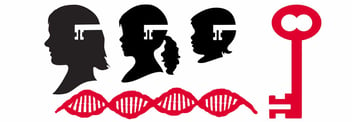Your COMT Gene and the Genetics of Stress
- Home
- Blog

If you are frequently stressed out, your COMT gene may be playing a role. Genetic testing can help you understand the biological basis for your stress response and how you can manage it to promote better mental health. In this blog, you will find the following:
- The genetics of stress
- The COMT gene, defined
- COMT: a deeper look
- Treating stress with the COMT gene
- COMT for kids
"Why am I so stressed?" How the COMT gene plays a role in your stress response
Like a rough sea, life stress approaches us with threatening waves. But how we react to those waves can vary greatly. Some of us see those waves as an opportunity and ride them until we can declare ourselves victorious against them. Others, however, can’t seem to get out from under their crushing undertow, and feel like they are drowning.
For better or worse, the way we handle stress can have an impact on our self-image. If we handle it well, we describe ourselves as resilient, tough, thick-skinned. And if we don’t? We often feel shame and guilt; we feel thin-skinned and weak-willed. Why can’t I handle this? we ask ourselves. So many people have it much worse, and yet I can’t seem to shake this stressed-out feeling… what’s wrong with me?
Well reader, I have some news when it comes to stress: It’s not just you, it’s your genes, too. Specifically, one critical aspect of resilience to stress derives from your COMT gene. And the more you know about the type of genetic variation you have in this gene, the more you can begin to understand—and cope with—those waves of stress. Let’s take a deeper look into the COMT gene: Surf’s up!
What is the COMT gene?
So, you’re stressed out. Your to-do list is too long, your relationships are suffering, you forgot a crucial task that you’re going to have to cram for but you just don’t have the hours. As I mentioned, the biological mechanisms behind our feelings and the physical manifestations of stress are universal. As our thoughts begin to spin out of control, our bodies respond by releasing a trio of neurotransmitters known as the Catecholamines—epinephrine (adrenaline, both a hormone and a neurotransmitter), norepinephrine, and dopamine. You might be familiar with the “fight, flight, or freeze” response: that’s adrenaline rising in your body, pushing you to act (or freeze, like a deer in the headlights)—and that’s your body on stress.
Now, if stress—or those Catecholamines—hits you like a “wave”, you might consider the COMT gene as your body’s surfboard. The COMT gene is responsible for making an enzyme known as Cachetol-O-MethylTransferase… and this wordy enzyme has a similarly singular responsibility: Deactivate those Catecholamines. By breaking down those stress neurotransmitters and hormones, the COMT gene is directly responsible for bringing your heartbeat down to normal levels and restoring a sense of balance both to your physiological and your psychological self. In other words: It helps you ride the wave.
But there’s a catch: While the waves remain the same, not all surfboards are alike. And the more you know about the characteristics of your own board, the more equipped you will be, whether the ocean ahead is calm or stormy.

The COMT Gene, Explained
It is currently thought that 80% of the population has a genetic variant on their COMT gene—this alone is reason enough for this gene to be one of the most well researched. The COMT gene also happens to be extremely important when it comes to determining our personalities and dispositions. Why? Because the enzyme it codes for primarily breaks down neurotransmitters in the brain’s frontal lobe, which is responsible for things like short-term memory, our planning abilities (so-called “executive functioning”), behavioral inhibitions, and—of course—our reaction to stress. COMT is mainly produced in our brains, but also in the liver, kidneys, and blood. An extremely variable gene with the potential to determine important aspects of our very identities? Folks, this is a gene where it pays to know a bit about which variant you have, as your COMT variants can help to determine whether you are a “Worrier” or a “Warrior.”
Why? The COMT gene’s enzyme is responsible for breaking down neurotransmitters that have both positive and negative effects on your health—and depending on your personal genetic variation, that breakdown process (riding the wave!) can happen in one of three ways:
1) If your gene has a variation that produces more of the COMT enzyme, (the Val/Val variant) then both congratulations and condolences: You’re naturally equipped with a surfboard that allows you to ride out the stress-wave with relative ease. With an increased amount of enzyme, your body is naturally more efficient at breaking down the Catecholamines, and you’re able to reach emotional stability more easily. But compared to the next category, your executive functioning is generally not as good. It only performs well under higher or novel stress situations where your brain has a dopamine surge.
2) If your gene has a variable that produces less of the COMT enzyme, (the Met/Met variant) then you’re naturally equipped with a surfboard that doesn’t quite navigate those big stress-waves as easily. With less of that enzyme, it takes your body longer to rid itself of stress-inducing neurotransmitters, leaving you in a state of imbalance for longer, and creating higher rates of anxiety, ruminating (going over and over the same thoughts in your mind), and PTSD. But, there is a silver lining here: Unlike those with the Val/Val variant, you have superior executive functioning abilities. You can reason, solve problems, coordinate complex thought, and better foresee consequences—and you can concentrate better. This advantage appears to increase with the number of years of education that you achieve. However, under conditions of novel or high stress, your advantage goes away as the “dopamine surge” causes anxiety that interferes with your executive functioning.
3) The third group is naturally equipped with a surfboard that fits somewhere between these two.
If you’re feeling disappointed at the possibility that your difficulty coping with stress might be biological (or if you’re feeling rather elated knowing that your surfboard is good to ride those massive “Bomb Waves” for the rest of your life), I want to tell you about another consequence of these gene variations, because it’s a doozy. If you have more of the COMT enzyme and are more efficient breaking down those stress chemicals, then you naturally have less Catecholamines floating around your body on a daily basis—and that includes dopamine, the “pleasure chemical.” Likewise, if you have less of the COMT enzyme, you have more of those chemicals—and more dopamine can have a positive effect on your sense of wellbeing. Dopamine changes the firing rate of your brain’s neurons, speeding up the brain like a turbocharger for an automobile engine.
Reduce your stress levels by biohacking your COMT gene
Dopamine and the other two Catecholamines determine how you ride the stress wave—but they determine so much more than that as well, making genetic testing for the COMT gene critical in understanding how you can better serve your own mental health outcomes.
As we know from previous posts in my DNA series, dopamine is a key neurotransmitter related to our wellbeing. Higher levels of dopamine and other Catecholamines can bring about greater satisfaction in life… but too-high levels can make you less extroverted, more worrisome and anxious, and more neurotic. In fact, excessively high levels can lead to toxicity and psychosis (for example, think of “Meth psychosis”). Meanwhile, while lower levels of Catecholamines mean you’re better equipped to handle stress, it also can put you at an increased risk for depression, substance abuse, anger, and impulsivity.
In other words, these neurotransmitters can be a double-edged sword, and it can be difficult to weigh the benefits against the costs of having more or less of them in your system. But one thing remains certain. By obtaining a genetic testing, you can learn more about your own predispositions—and you can begin to take steps to mitigate the negatives. How?
If you have the COMT Val/Val variant you may benefit from being treated with stimulants, and by including flavonoids (red wine, berries, apples), and Quercetin (red wine, berries, cherries, leafy veggies) in your diet. Research also shows that if you have this variant along with ADHD, you will have an 87% response to Ritalin (methylphenidate). If you are depressed with a BMI greater than 30, you will also have a better response to antidepressants if L-Methylfolate is added.
If you have the COMT Met/Met variant you many benefit from SAMe, Magnesium, NAC (may augment cognitive behavioral therapy in PTSD), or Vitamin D. And in the presence of this variant with ADHD, there is a 58% response to Ritalin, with 43% of patients reporting a non-response or worsening of symptoms.
DNA 4 KIDS With GENiE and Dr. Novitsky

COMT and the Three Bears
"GENiE, I wish for a fairy tale..."

Your wish is granted. Do you remember the story of Goldilocks and the Three Bears? A little girl wanders upon a cottage in the middle of the forest. Inside, she tastes three bowls of porridge—the first is too hot, the second too cold, and then she cheerfully consumes the third bowl that is “just right”. Feeling tired, she looks to rest upon a chair. The first is too big, the second too small, but the third chair is just right. Feeling cozy, she looks to settle down for a brief nap but finds the first bed too hard, the second too soft, and the third just right.
In our bodies, we have an important gene recipe for COMT, a chemical involved in balancing two very important jobs: helping us to concentrate and helping to remove stress. (Recall the master builder scenario for MTHFR that builds up important brain chemicals? COMT acts in just the opposite way to take us in the opposite direction by breaking down chemicals.)
If you are born with COMT that is “too active”, you may be pretty good with staying calm, but might have some difficulty staying focused in school. If you are born with COMT that is “too slow” with its job, then you’re likely more alert but may end up being more anxious and worried. Thanks to Genomind genetic testing, we can find out what kind of balance we were born with and make adjustments to our lifestyle, diet, and possible medications—like Goldilocks, we need to find the balance that is “just right.”
Use a Simple Cheek Swab to Do Something About Your Response to Stress
As you go through life, which shall you become: a “champion surfer” or a “gnarly surfer?” In large measure, the outcome will be up to you. DNA is not your destiny. But as with everything: Knowledge is the ultimate Power. You can work with the DNA you were born with to determine a different fate. I recommend COMT genetic testing and discussing with your doctor how you can take advantage of your results, whatever they are!

DNA: I Am Who I Am… or Am I? Blog Series
- Does DNA Determine My Destiny?
- Tinker with Your Genes to Determine Your Destiny
- A Simple Cheek Swab Brings Good Karma
- Test Your DNA to Determine Your Reality
- The BDNF Gene: Use “Fertilizer” to Grow a Majestic ”Rainforest Brain”… and Introducing “GENiE” and “DNA 4 KIDS”
- The MTHFR Gene: “Manufacture” Your Way to Health and Happiness Featuring “DNA 4 KIDS” with “GENiE”
- The SLC6A4 Gene (Serotonin Reuptake Gene): Improve Your Mood and Anxiety through a Simple Cheek Swab Featuring “DNA 4 KIDS” with “GENiE”
- Tame that Emotional Roller Coaster Ride Genetic Testing for the ANK3 Gene and CACNA1C Gene Featuring “DNA 4 KIDS” with “GENiE”
- Is Addiction Inherited? Genetic Testing for the OPRM1 Gene, Opioid Abuse, and Alcoholism Featuring “DNA 4 TEENS” With “GENiE”
- Surf’s Up: Use Your Genetic Code to Ride the Stress Wave with Ease The COMT Gene Featuring “DNA 4 KIDS” With “GENiE”
- Mental Illness is not a Myth—and Human Genomics Proves It The DRD2 Gene and Dopamine Featuring “DNA 4 KIDS” With “GENiE”
- ADHD in the Age of Distraction The Tricky Genetics behind ADHD and ADRA2A Featuring “DNA 4 KIDS” With “GENiE”
- Overweight and Obesity – Is it Me, or My DNA? 5HT2C and MC4R: Can Your Genes Make You Fat?
- Is Alcoholism Inherited? Can a Tiny Gene Help Treat It? The GRIK1 Gene
- 2018 Women’s Health and Wellness Summit DNA Keynote Address
Related Information
- Learn about Genetic Testing
- Learn about Potomac Psychiatry
- Meet Our Doctors
- Contact Potomac Psychiatry
.png?width=144&height=144&name=Untitled%20design%20(34).png)





